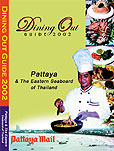Pattaya Mail
special correspondent Peter Cummins was recently in Sri Lanka on an
assignment with the United Nations Children’s Fund (UNICEF) and he found
the country - especially its children - bearing a number of similarities
to our own Thailand. With the Kingdom brokering and soon (probably next
month) to host the peace accords between the Tamil Tigers (LTTE) and the
Sri Lanka government, ending decades of brutal and murderous warfare for
control of the island’s northern provinces, there was an air of hope,
expectation and increasing tolerance, especially among the younger
generations who have known violence for most of their lives.
This is the first of several stories which will
accentuate the similarities rather than the differences between the two
predominantly Buddhist cultures. This first one, rightly so, however,
concentrates on the great gains being made by Thai young people - with
much support from UNICEF, individuals, non-Governmental Organizations and
institutions in both the public and private sectors - with just passing
references to Sri Lanka’s children.
by Peter Cummins,
UNICEF, Thailand
A world
fit for children
Things are happening in the world, things
besides murder, mayhem, corrupt corporations, cheating, lying, war, famine
abject poverty of millions, greed and child abuse, to name a few of the
great achievements of the human race these past few years (decades,
centuries?).
 Prime
Minister Thaksin Shinawatra praised the Thai youth “for their
creativity” and pledged that the “government agencies concerned with
children, youth, the family and education” would apply the needs of
youth, as expressed in the forum, into government policy which has already
been approved by the Thai Cabinet. (AP Photo/Charles Dharapak)
Prime
Minister Thaksin Shinawatra praised the Thai youth “for their
creativity” and pledged that the “government agencies concerned with
children, youth, the family and education” would apply the needs of
youth, as expressed in the forum, into government policy which has already
been approved by the Thai Cabinet. (AP Photo/Charles Dharapak)
Rather than “things”, though, it is a movement. Not
the tired old movements which have appeared over the years: rallies,
marches, protests and groups gathering and raising their collective voices
defending their rights against whatever causes bother them at any given
time, eventually to disappear.
Now, there are voices raised - voices which are going
to “be heard around the world”, as a renowned leader once said of an
anti-war movement many years ago. These new voices are going to be with us
for a long time; in fact they are going to be the leaders of a, hopefully,
different world in the decades to come.

The
temple housing the tooth of Buddha, Kandy, at dusk.
It is the “Voice of Children”, to borrow from the
title of a new publication of the United Nations Children’s Fund
(UNICEF) and it is voices being heard around a world that they are now
having a little chance of shaping, thanks to a global movement, nurtured
by the United Nations, non-Governmental organizations and many
institutions in both the public and private sectors.
In Thailand, as elsewhere, children are not only
“tuned in” to the media - they are running some of it: radio,
television and such programmes as Child Wave Radio, a Youth News Centre
and in some up-country areas, training for youth and students in theatre
and radio production, empowering them and providing the channels for
communicating and expressing their views on community affairs.
Histrionics, to emphasize a problem, is a great medium used in such
countries as Sri Lanka where children perform live tableaux in village
squares, to bring home the dangers of such diseases as dengue fever,
conflict in unhappy homes which cause enormous stress for young people,
simulated scenes of child labour and a myriad other social ills.
“The Child Wave Radio”, specifically, operates five
days a week in Phitsanulok and Chiang Rai and, now, with UNICEF
assistance, has been extended to almost half of Thailand’s provinces,
with more than 500 young people airing their views on social issues,
child’s rights and many other matters which affect them specifically and
the social fabric generally.
 A
tableau of the dangers of dengue fever unfolds in a Sri Lanka village
square.
A
tableau of the dangers of dengue fever unfolds in a Sri Lanka village
square.
There is another good comparison here with Sri Lanka
also: the Thai Youth News (TYN) is operated by youngsters who are being
trained in all forms of media and is aired once a week on Thailand’s
National TV Channel 11. The Young Asia Television in Colombo produces
daily spots. Although not specifically aimed at children’s rights,
nevertheless YATV - as it is euphemistically called - produces
documentaries covering the gamut of human problems. The average age of the
channel’s personnel, who are all trained from novices in all forms of
media - is just 23 years.
There is hope for the future: it is in the “Voices of
Children”.
The Thai National Youth
Parliament
Suchart was just so excited that he could hardly
breathe, let alone be able to express his views reflecting those of Thai
children AND have the opportunity of not only meeting his own prime
minister and accompanying senior Thai government officials, but to
interview them and be empowered to table the concerns of young people in a
face-to-face meeting with the country’s leaders, through the medium of
the National Youth Parliament.
H.E. Prime Minister Thaksin Shinawatra, Minister Suwit
Kunkitti, Deputy Minister of Education Dr. Sirikorn Maneerin, Minister of
Public Health Sudarat Kaeyurapan and other key government officials joined
with senior UNICEF staff on a visit to the Thai Youth Parliament, a first
for both government officials and Thai young people.
 The
ubiquitous Sri Lanka elephant: watching over society.
The
ubiquitous Sri Lanka elephant: watching over society.
Suchart was very quick to rise to the occasion,
however, and although this meeting took place earlier this year during
January when Thailand celebrates Children’s Day, it was the first-ever
Thai National Youth Parliament and has set a new course for Thai children
and, by their example, children elsewhere in the world.
Along with another 250 youth representatives from all
of Thailand’s 76 provinces, including a big contingent of physically
disadvantaged young people, Suchart and many of his peers were able to
present to the government a number of the vital and pressing issues facing
young people in the Kingdom - in fact globally - in the broad context of
the improved protection of children from violence, abuse, exploitation and
discrimination.
These are some of the themes, in fact, which
reverberated throughout the corridors of the United Nations from 8 - 10
May this year, at the United Nations General Assembly Special Session on
Children. The world’s young people raised their voices in unison, as
accredited delegates to the Assembly, not just requesting the world’s
leaders to hear them and then merely pay ‘lip service’ to their needs
and rights, as in the past, but to galvanize into action on such
destructive forces as AIDS and other diseases afflicting children. The
young people demanded access to education for an estimated 120 million
children worldwide, who were denied even the basics of learning.
Furthermore, the youth delegates railed strongly against government’s
which fail to respect children’s rights - even among UN Member States
which have acceded to the United Nations’ Convention on the Rights of
the Child.
Thailand’s Youth Parliament represented a direct
approach to its leaders and the reaction was most positive. The prime
minister himself praised the Thai youth “for their creativity” and
pledged that the “government agencies concerned with children, youth,
the family and education” would apply the needs of youth, as expressed
in the forum, into government policy which has already been approved by
the Thai Cabinet.
HIV/AIDS
UNICEF is making great strides in fighting
HIV/AIDS, a scourge of Thailand’s north and north-east provinces, the
poorest in the Kingdom where, in co-operation with the Buddhist clergy,
state agencies and individuals, UNICEF supports (for more than seven
years), a programme known as “The Sangha Metta”. This self-help idea
is implemented by the Buddhist Monks who use the local temple (Wat) as a
base to work with village head-men, house-wives, in fact, everyone
involved - to help alleviate the suffering and overcome the superstition
and ignorance surrounding the epidemic - a stigma which impacts very
negatively upon the child victims of HIV/AIDS parents.
 Sri
Lanka children perform a dance on family conflict.
Sri
Lanka children perform a dance on family conflict.
A number of projects have also been initiated to help
the Hilltribe people, with education, skill development and other
assistance which has gone a long way to help these young people - so prone
to social and sexual exploitation - become proud, independent and
productive, many maintaining their own crops, cattle and fish farms, all
producing income.
Girls’ education
Also related to the northeastern areas of Thailand is a project
pioneered by a group of Bangkok-based international hotels and strongly
supported by UNICEF known as the Youth Career Development Programme (YCDP).
Established in 1995 by the Pan Pacific Hotel in Bangkok, this unique
programme is designed to train disadvantaged girls to enter Thailand’s
burgeoning hotel and tourism industry. It has developed from a few hotels
back seven years ago, taking on some trainees, to 14 hotels with 67
trainees in 2000. Now, in 2002, the intake is 107, for 19 leading hotels,
with the Standard Chartered Nakornthon Bank joining as a sponsor and
Bumrungrad, one of Bangkok’s leading hospitals, recognized among the
world’s best, offering full nursing scholarships to 25 young girls.
All girls selected for these programmes are
disadvantaged by poverty and, thus, highly vulnerable to exploitation,
drug abuse and prostitution from which the only way forward is downwards.
Now, after undertaking their five-month (hotel) and nine-month (nursing)
courses, these girls will be equipped to handle and, indeed, embark on a
life of hope, pride and accomplishment.
The hotels train the interns in a wide range of facets
of the hotel and tourism sectors, including housekeeping, laundry, flower
arranging, food and beverage. Perhaps as importantly, the young girls
learn “life-coping” skills, including sex education, the study of the
insidious dangers of HIV/AIDS, child rights and child protection awareness
programmes.

UNICEF
to the rescue: helping disadvantaged girls in Sri Lanka.
Those graduates who do not, in fact, join their
sponsoring hotel’s staff enter government, teaching or private sector
occupations.
So successful has this programme been that a similar
scheme has been adopted by the Royal Thai Government Skills Development
Department for training young people nation-wide in the services sector
and in such non-governmental organizations as the Royal Project
Foundation. Furthermore, the Biotechnology and Genetic Engineering Centre
of the government’s Ministry of Science is now training at-risk
adolescent girls in such areas as tissue culture and agro-industry.
On Saturday August 3, Pattaya had the honour and special
privilege to host the first meeting of SKÅL International-Thailand executive
committee’s new board, attended by its president, Malai Sakolvipak.

Andrew Wood
presents the check for 114,000 Baht to President Murray Hertz and V.P. Peter
Malhotra. Andrew received sponsorship for competing in the Pattaya Marathon to
raise funds for the bid for the Skål World Congress to be held in Pattaya in
2006.
Traditionally the board consists of the presidents of each SKÅL
Club operating in Thailand, which at present includes Bangkok, Pattaya East
Thailand and Phuket. The meeting took place in the palatial Royal Cliff Grand at
the Royal Cliff Beach Resort and was later followed by a cocktail party and
dinner for all the local members to meet the national team.
SKÅL International-Thailand has a pivotal role of
coordinating SKÅL activities throughout Thailand. It also overseas all
administration of the clubs and is responsible for the collection of fees and
data on the membership. The national committee records its activities and
reports to SKลL International headquarters in Europe. It also has a dotted
line to SKÅL International-Asian Area and members regularly attend inter
regional meetings.

(L to R)
Somsak Charnsirisakskul, Somsak Kiratipanich, Prasarnsiri Samargachan, Malai
Sakolvipak, Murray Hertz, Patty D’Cruz and Andrew Wood.
The Pattaya meeting turned out to be extremely productive,
dealing with pressing issues including discussion on ways to widen membership
and improve the financial situation in all clubs. Minutes of the Chiang Mai
assembly were reviewed along with a report from the national treasurer, Bessie
Samargachan - a well-respected member of the travel industry and MD of Boonvanit
Travel - an industry heavyweight.
 Deborah
Bundityanond is presented her official certificate of membership for Skål
Pattaya and East Thailand.
Deborah
Bundityanond is presented her official certificate of membership for Skål
Pattaya and East Thailand.
Much discussion took place around Pattaya’s bid for the
2006 Congress, which would coincide with the 50th anniversary of Skål in
Thailand, and a report was given by Ms Patty D’Cruz, director of sales at
PEACH, of their meeting with President Malai and TAT executives in Bangkok to
discuss participation and sponsorship opportunities.
 Khun
Busakorn Khogkha-in is presented her official certificate of membership for Skål
Pattaya and East Thailand.
Khun
Busakorn Khogkha-in is presented her official certificate of membership for Skål
Pattaya and East Thailand.
As part of Andrew Wood’s fund raising activities for the
club, Andrew requested Bt 200,000 be given to the Pattaya Club to be used
together with club’s own efforts as a ‘war chest’ to win the 2006 Congress
bid against London. This was voted and passed with a comfortable majority.
Andrew also confirmed a cheque would be presented that evening for the 114,000
baht he raised through sponsorship in last month’s Pattaya marathon to be put
towards the bid for the world congress in 2006. This along with the national
donation will exceed Bt 300,000 to date.
 Max
Foster is presented his official certificate of membership for Skål Pattaya and
East Thailand.
Max
Foster is presented his official certificate of membership for Skål Pattaya and
East Thailand.
The decision will be made this November in Cairns, Australia
where the 2002 World congress will be held. A contingent from Skål Pattaya and
East Thailand, as well as other clubs in Thailand, intend to visit Cairns to
persuade voters to move the conference to sunny Pattaya.
Thailand is competing against London for the congress in
2006. One advantage Pattaya has over London is the climate; since it would be
held in December of that year, London would be rather cold. Thailand being much
cheaper than London is also a plus.
Following the cocktail reception, dinner was also eventful
with new members being officially recognized by the home office in Spain. Each
new member was presented with a certificate of membership.
Also on the agenda was discussion of Thailand’s (Phuket)
bid for the smaller 2005 Asian Assembly meeting.

Manit
Boonchim, Director of TAT Region 3; Malai Malai Sakolvipak, President and
International councilor of Skål Thailand, and Bessie Samargachan, the treasurer
of Skål Thailand pose with Skๅlleagues after dinner at the Chrysanthum
Palace Restaurant.
SKÅL has almost 24,000 members in over 500 clubs in 80 countries throughout
the world. For more information on how you might join your local club please
contact President Murray Hertz or the club secretary at [email protected]
for an application form.



 Prime
Minister Thaksin Shinawatra praised the Thai youth “for their
creativity” and pledged that the “government agencies concerned with
children, youth, the family and education” would apply the needs of
youth, as expressed in the forum, into government policy which has already
been approved by the Thai Cabinet. (AP Photo/Charles Dharapak)
Prime
Minister Thaksin Shinawatra praised the Thai youth “for their
creativity” and pledged that the “government agencies concerned with
children, youth, the family and education” would apply the needs of
youth, as expressed in the forum, into government policy which has already
been approved by the Thai Cabinet. (AP Photo/Charles Dharapak)
 A
tableau of the dangers of dengue fever unfolds in a Sri Lanka village
square.
A
tableau of the dangers of dengue fever unfolds in a Sri Lanka village
square. The
ubiquitous Sri Lanka elephant: watching over society.
The
ubiquitous Sri Lanka elephant: watching over society. Sri
Lanka children perform a dance on family conflict.
Sri
Lanka children perform a dance on family conflict.


 Deborah
Bundityanond is presented her official certificate of membership for Skål
Pattaya and East Thailand.
Deborah
Bundityanond is presented her official certificate of membership for Skål
Pattaya and East Thailand. Khun
Busakorn Khogkha-in is presented her official certificate of membership for Skål
Pattaya and East Thailand.
Khun
Busakorn Khogkha-in is presented her official certificate of membership for Skål
Pattaya and East Thailand. Max
Foster is presented his official certificate of membership for Skål Pattaya and
East Thailand.
Max
Foster is presented his official certificate of membership for Skål Pattaya and
East Thailand.






